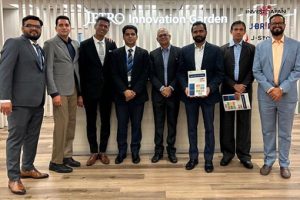The chief executive of RISC-V International has voiced concerns over potential government restrictions on open-source technology, warning that such limitations could impede the development of advanced chips, ultimately hindering progress in the global technology industry.
These comments come in response to recent reports by Reuters, which revealed that a growing group of U.S. lawmakers is urging the Biden administration to impose export control restrictions on RISC-V, an open-source technology overseen by the RISC-V International nonprofit foundation. RISC-V technology serves as a fundamental building block for creating chips used in smartphones and artificial intelligence applications.
Prominent U.S. companies like Qualcomm and Alphabet’s Google have embraced RISC-V, but the technology has also garnered attention from Chinese firms, including Huawei Technologies Co. These Chinese engagements have raised national security concerns among U.S. lawmakers.
Calista Redmond, the CEO of RISC-V International, addressed these concerns in a recent blog post. She emphasized that RISC-V is no different from other open technology standards, such as Ethernet, which enables computers on the internet to communicate effectively.
Redmond expressed her apprehension regarding potential government actions to impose unprecedented restrictions on open standards like RISC-V. She emphasized that such actions could result in reduced access to a global marketplace for products, solutions, and talent. She also warned that segregating standards could lead to a world of incompatible solutions, duplicating efforts and limiting market access.
The CEO highlighted the collaborative nature of RISC-V’s development, with contributions coming equally from North America, Europe, and Asia. She clarified that the standards published by the foundation do not constitute a comprehensive blueprint for chip manufacturing and do not offer more information than what is available from proprietary chip technology companies like Arm Holdings.
Redmond emphasized that the key distinction lies in allowing the marketplace to utilize these open standards without requiring proprietary licenses from a controlling entity. Access to open standards enables companies to innovate more rapidly and focus their efforts on creating unique and differentiated products, rather than reinventing fundamental technologies.
As the debate over potential government restrictions on open-source technology continues, the global tech industry will closely monitor developments and their potential impact on innovation, competition, and market dynamics.
Top of Form
CEO of RISC-V International Warns Against Government Restrictions on Open-Source TechnologyCEO of RISC-V International Warns Against Government Restrictions on Open-Source TechnologyCEO of RISC-V International Warns Against Government Restrictions on Open-Source TechnologyTop of Form
Top of Form






















